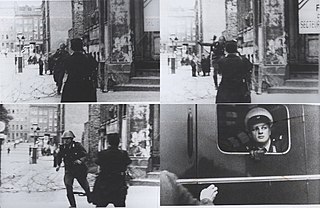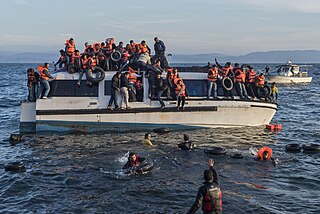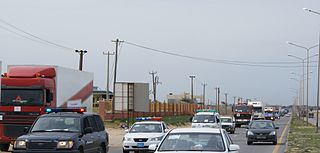The Office of the United Nations High Commissioner for Refugees (UNHCR) is a United Nations agency mandated to aid and protect refugees, forcibly displaced communities, and stateless people, and to assist in their voluntary repatriation, local integration or resettlement to a third country. It is headquartered in Geneva, Switzerland, with over 18,879 staff working in 138 countries as of 2020.

A refugee, conventionally speaking, is a person who has lost the protection of their country of origin and who cannot or is unwilling to return there due to well-founded fear of persecution. Such a person may be called an asylum seeker until granted refugee status by the contracting state or the United Nations High Commissioner for Refugees (UNHCR) if they formally make a claim for asylum.

The United Nations System consists of the United Nations' six principal bodies, the Specialized Agencies and related organizations. The UN System includes subsidiary bodies such as the separately administered funds and programmes, research and training institutes, and other subsidiary entities. Some of these organizations predate the founding of the United Nations in 1945 and were inherited after the dissolution of the League of Nations.

An internally displaced person (IDP) is someone who is forced to leave their home but who remains within their country's borders. They are often referred to as refugees, although they do not fall within the legal definitions of a refugee.

Forced displacement is an involuntary or coerced movement of a person or people away from their home or home region. The UNHCR defines 'forced displacement' as follows: displaced "as a result of persecution, conflict, generalized violence or human rights violations".

Eduardo Stein Barillas is a Guatemalan diplomat who served as the Vice President of Guatemala from 14 January 2004 to 14 January 2008, serving a concurrent four-year mandate with President Óscar Berger. He is currently the Joint Special Representative of the UN High Commissioner for Refugees and the International Organization for Migration for Venezuelan refugees and migrants.
The Russian Federation's Law on Refugees defines who is a refugee for purposes of obtaining asylum in the country. The Law defines a refugee as a "person who is outside their country of nationality or habitual residence; has a well-founded fear of persecution because of their race, religion, nationality, membership in a particular social group or political opinion; and is unable or unwilling to avail themself of the protection of that country, or to return there, for fear of persecution". Upon receiving an asylum seeker's application, the Russian Migration Service determines whether the asylum seeker meets the legislative definition of a "refugee" and should be granted asylum.
Bruno Geddo is an Italian national, born in Novara in 1959. He has served with the United Nations High Commissioner for Refugees (UNHCR) for over 30 years in Sub-Saharan Africa, North Africa and the Middle East.
United Nations Action Against Sexual Violence in Conflict a cross-UN initiative that unites the work of 24 United Nations entities tasked with the goal of ending sexual violence in conflict. The 24 UN entities are from sectors that include peacekeeping, political affairs, justice, human rights, humanitarian, health, gender equality and women's empowerment. The Special Representative of the Secretary-General Pramila Patten chairs the network, which represents an effort by the UN to improve its coordination and accountability, amplify advocacy, and support national efforts to prevent sexual violence and respond effectively to the needs of survivors. The UN Action Secretariat is based in the Office of the Special Representative of the Secretary-General on Sexual Violence in Conflict.
The United Nations High Commissioner for Refugees Representation in Cyprus is an office of the United Nations High Commissioner for Refugees (UNHCR) opened in August 1974 upon the request of the Government of Cyprus and the Secretary-General of the United Nations. UNHCR Representation in Cyprus was designated as Coordinator of the United Nations Humanitarian Assistance for Cyprus. UNHCR was also responsible upon the request of the Cyprus Government to examine applications for refugee status.

On 18 December 1990, the General Assembly adopted a resolution on the International Convention on the Protection of the Rights of All Migrant Workers and Members of Their Families.

The International Organization for Peace, Care and Relief is a non-governmental organization based in Tripoli, Libya. Founded in 1999, the organisation has special Consultative Status with the Economic and Social Council of the United Nations (ECOSOC) and has an independent legal and financial status. The president of the organization is Khaled K. El-Hamedi.
Refugees of the Syrian civil war are citizens and permanent residents of Syria who have fled the country throughout the Syrian civil war. The pre-war population of the Syrian Arab Republic was estimated at 22 million (2017), including permanent residents. Of that number, the United Nations (UN) identified 13.5 million (2016) as displaced persons, requiring humanitarian assistance. Of these, since the start of the Syrian civil war in 2011 more than six million (2016) were internally displaced, and around five million (2016) had crossed into other countries, seeking asylum or placed in Syrian refugee camps worldwide. It is often described as one of the largest refugee crises in history.
International Organization for Migration (IOM) Mission in Ukraine is an official representative office of the International Organization for Migration in the country and is located in its capital city Kyiv.

The Office of the Special Representative of the Secretary-General on Sexual Violence in Conflict (OSRSG-SVC) is an office of the United Nations Secretariat tasked with serving the United Nations' spokesperson and political advocate on conflict-related sexual violence, the Special Representative of the Secretary-General on Sexual Violence in Conflict (SRSG-SVC). The Special Representative holds the rank of Under-Secretary-General of the UN and chairs the UN Action Against Sexual Violence in Conflict. The mandate of the SRSG-SVC was established by Security Council Resolution 1888, introduced by Hillary Clinton, and the first Special Representative, Margot Wallström, took office in 2010. The current Special Representative is Pramila Patten of Mauritius, who was appointed by UN Secretary General António Guterres in 2017. The work of the SRSG-SVC is supported by the UN Team of Experts on the Rule of Law/Sexual Violence in Conflict, co-led by the Department of Peacekeeping Operations (DPO), Office of the High Commissioner for Human Rights (OHCHR) and the UN Development Programme (UNDP), also established under Security Council Resolution 1888.

George Gigauri or Giorgi Gigauri is a UN official and senior humanitarian, serving as the Chief of Mission of the International Organization for Migration (IOM), the UN Migration Agency, in Iraq.
As Indonesia did not sign the convention on the status of refugees and lacks any domestic legislations providing refugees rights, refugees in Indonesia do not have the right to employment, permanent residency or citizenship.

Rabab Fatima is a Bangladeshi diplomat. She is currently the high representative of the United Nations for the least developed countries, landlocked developing countries and small island developing states (UNOHRLLS). Between 2019 and July 2022, she served as the Permanent Representative of Bangladesh to the United Nations. Prior to this, she was Bangladesh Ambassador to Japan. On 1 February 2022, she was elected the Chair of the United Nations Peacebuilding Commission (PBC).
The Office of International Organization for Migration (IOM) Director General's Special Envoy for the Regional Response to the Venezuela Situation (OSE) is based in Panama City, Panama, and leads the coordination and operational oversight for 17 countries in Latin America and the Caribbean operating under the framework of the Regional Refugee and Migrant Response Plan (RMRP), while serving as co-lead with UNHCR of the Inter-Agency Coordination Platform for Refugees and Migrants (R4V).
















